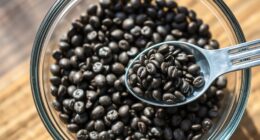Hello! We are delving into the world of seed nutrition to discover the rich protein content they possess.
In this article, we’ll uncover the protein content of chia seeds and the benefits they offer for meeting our protein needs.
We’ll also compare chia seeds to other protein sources and highlight why they can be considered a complete protein source.
So, if you’re looking to incorporate chia seeds into a high-protein diet, stick around for some evidence-based insights on this nutritious seed!

Key Takeaways
- Chia seeds are a nutritious choice for supporting fitness goals and increasing overall protein intake.
- Chia seeds contain all nine essential amino acids and have excellent protein absorption.
- Chia seeds have high-quality protein that is easily absorbed by our bodies and are a plant-based protein alternative suitable for vegans and vegetarians.
- Chia seeds promote satiety and weight management due to their fiber and protein content.
Protein Content in Chia Seeds
Chia seeds are known for their high protein content, making them an excellent addition to our diet. These tiny seeds pack a powerful punch when it comes to protein benefits. With approximately 4 grams of protein per ounce, chia seeds are a great source of this essential macronutrient.
Protein plays a crucial role in the body, aiding in muscle repair, supporting immune function, and promoting overall growth and development. But it’s not just the quantity of protein in chia seeds that makes them special; it’s also their quality. Chia seeds contain all nine essential amino acids, which are the building blocks of protein.
Additionally, chia seeds have been shown to have excellent protein absorption, meaning our bodies can efficiently utilize the protein they provide. So, whether you’re looking to support your fitness goals or simply boost your overall protein intake, chia seeds are a nutritious choice.
Benefits of Chia Seeds for Protein Intake
One of the key benefits of incorporating chia seeds into our diet is the significant increase in our protein intake. Chia seeds are packed with protein, making them an excellent choice for those looking to boost their protein consumption.
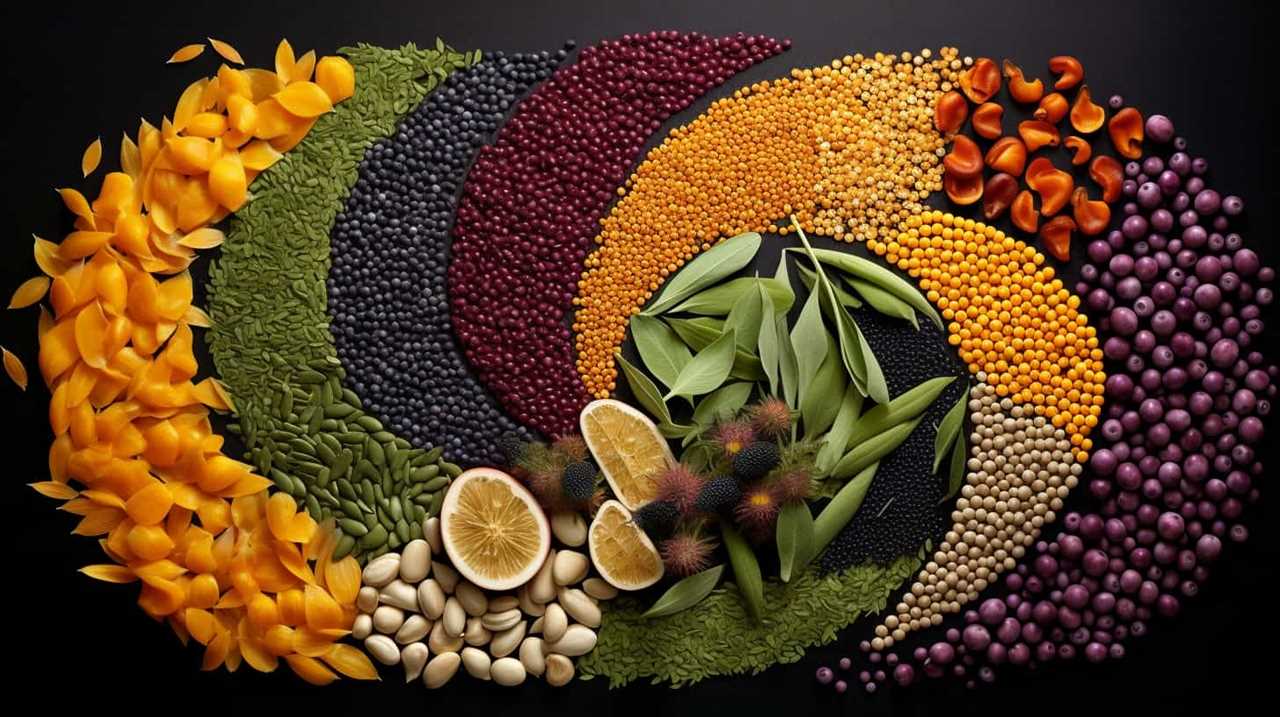
Here are some reasons why chia seeds are beneficial for protein intake:
-
Chia seed protein absorption: Chia seeds contain a high-quality protein that’s easily absorbed by our bodies. This means that we can efficiently utilize the protein present in chia seeds to support muscle growth and repair.
-
Chia seeds as a vegan protein alternative: Chia seeds are an excellent source of plant-based protein, making them a great option for vegans and vegetarians. They provide all nine essential amino acids, making them a complete protein source.
-
Versatility in recipes: Chia seeds can be easily incorporated into various dishes, such as smoothies, puddings, and baked goods, to increase protein content. This versatility allows us to enjoy the benefits of chia seeds while adding protein to our meals.

-
Satiety and weight management: Chia seeds are rich in fiber and protein, which can help promote feelings of fullness and support weight management goals. By adding chia seeds to our diet, we can enhance satiety and potentially reduce calorie intake.
-
Nutrient-rich profile: Chia seeds not only provide protein but are also packed with essential nutrients like omega-3 fatty acids, antioxidants, and minerals. Incorporating chia seeds into our diet can contribute to overall nutrient intake and support optimal health.
Comparing Chia Seeds to Other Protein Sources
As we delve deeper into seed nutrition, it’s important to compare chia seeds with other protein sources to understand their unique benefits.
When it comes to protein content, chia seeds can rival even popular protein-rich grains like quinoa. While quinoa contains about 4 grams of protein per 100 grams, chia seeds boast an impressive 16.5 grams of protein per 100 grams.
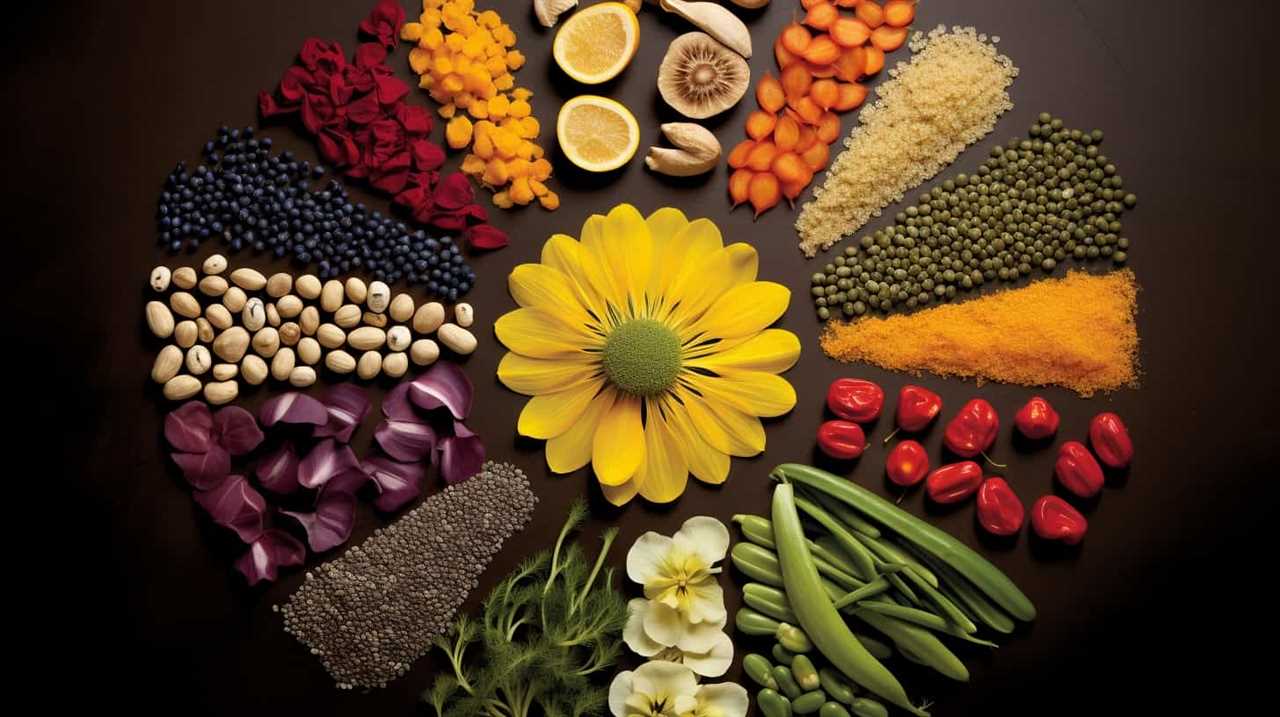
But it’s not just about protein content; the nutritional value of chia seeds also sets them apart from animal protein sources. Chia seeds are rich in essential amino acids, fiber, omega-3 fatty acids, and antioxidants, making them a valuable addition to a plant-based diet.
Chia Seeds: A Complete Protein Source
Continuing our exploration of protein sources, let’s delve into why chia seeds are considered a complete protein option.
Chia seeds are tiny powerhouses packed with essential nutrients, making them a popular choice among health-conscious individuals. Here are some reasons why chia seeds are a great addition to your diet:
-
High Protein Content: Chia seeds contain all nine essential amino acids, making them a complete protein source.
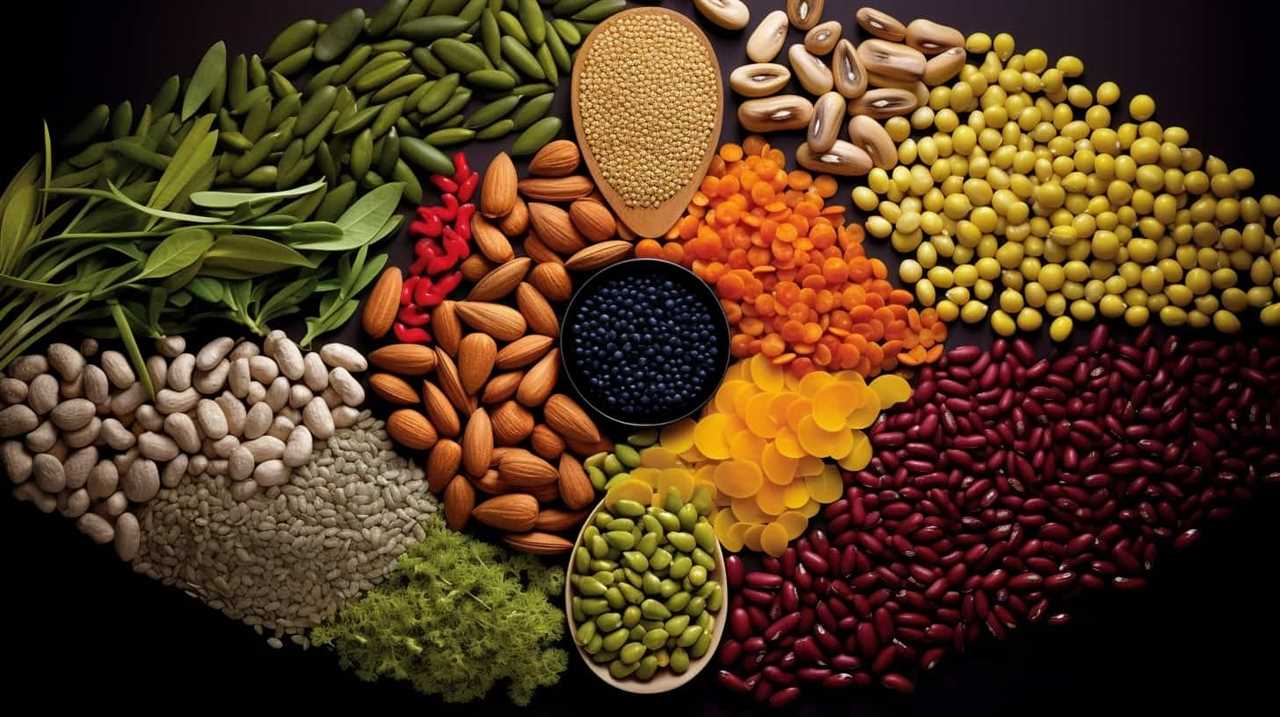
-
Rich in Fiber: With 10 grams of fiber per ounce, chia seeds promote healthy digestion and help maintain a feeling of fullness.
-
Omega-3 Fatty Acids: Chia seeds are an excellent plant-based source of omega-3 fatty acids, essential for heart health.
-
Antioxidant Properties: Chia seeds are rich in antioxidants, which help protect cells from damage caused by free radicals.
-
Versatile and Easy to Use: Incorporate chia seeds into your diet by adding them to smoothies, yogurt, or using them as an egg substitute in recipes.

Discover the numerous benefits of chia seeds and try out some delicious chia seed recipes to boost your protein intake and overall health.
Incorporating Chia Seeds Into a High-Protein Diet
To maximize our protein intake, we can easily incorporate chia seeds into a high-protein diet using a variety of delicious and nutrient-rich recipes. Chia seeds aren’t only a complete protein source, but they also provide numerous health benefits.
These tiny seeds are packed with essential amino acids, omega-3 fatty acids, and fiber. Chia seeds can be added to smoothies, yogurt, oatmeal, or used as an egg substitute in baking. For muscle recovery, chia seed pudding is a great choice. Combine chia seeds with almond milk, protein powder, and a sweetener of your choice. Let it sit overnight, and in the morning, you’ll have a creamy, protein-packed treat.
Frequently Asked Questions
Can Chia Seeds Be Used as a Protein Supplement for Athletes or Bodybuilders?
Yes, chia seeds can be used as a protein supplement for athletes or bodybuilders. Incorporating chia seed recipes into their diet can provide the benefits of chia seeds for muscle recovery and aid in meeting their protein needs.
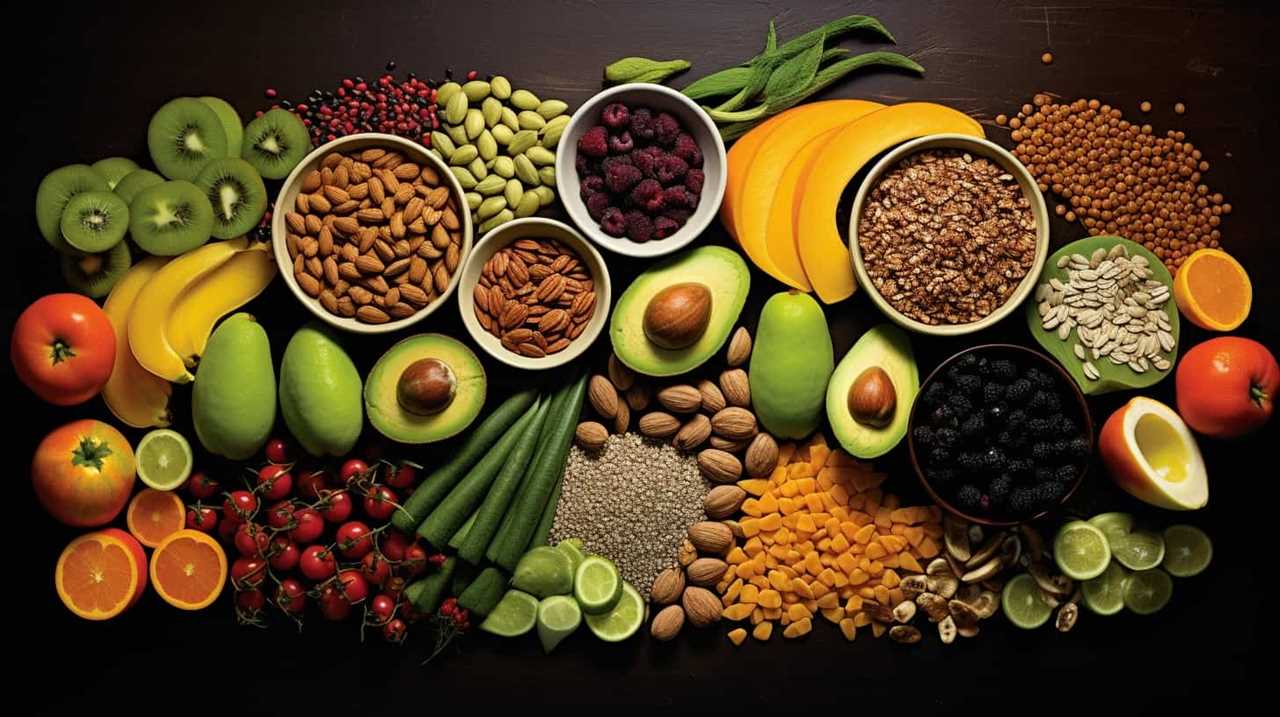
How Does the Protein Content in Chia Seeds Compare to Other Plant-Based Protein Sources Like Soy or Quinoa?
When comparing the protein content of chia seeds to other plant-based sources like soy or quinoa, it’s important to consider their role in muscle building. Chia seeds vs hemp seeds.
Are There Any Potential Side Effects or Risks Associated With Consuming High Amounts of Protein From Chia Seeds?
We should be aware of potential side effects of consuming excess protein from chia seeds. It’s important to consider the impact of high protein intake on kidney health. Moderation is key for a balanced diet.
Can Chia Seeds Alone Provide All the Essential Amino Acids Required by the Body?
Yes, chia seeds alone can provide all the essential amino acids our bodies need. They are an excellent protein source for vegetarians and a sustainable alternative for those looking to reduce their environmental impact.
What Are Some Creative Ways to Incorporate Chia Seeds Into Meals and Snacks for a High-Protein Diet?
We’ve got some great ideas for incorporating chia seeds into your high-protein diet! Try making creative chia seed recipes like chia seed protein bars. They’re a delicious and nutritious way to boost your protein intake.

Conclusion
In conclusion, chia seeds offer a rich source of protein for those looking to boost their protein intake. With their impressive protein content and essential amino acid profile, they stand out among other protein sources. Incorporating chia seeds into a high-protein diet can provide numerous health benefits and support overall well-being.
So, why not consider adding these tiny powerhouses to your meals and enjoy the protein richness they offer.









